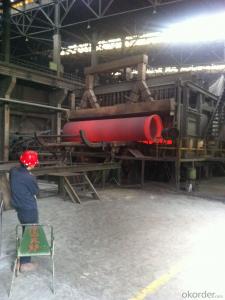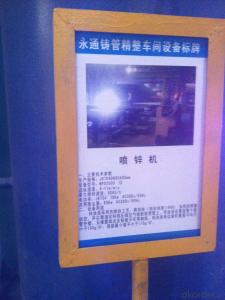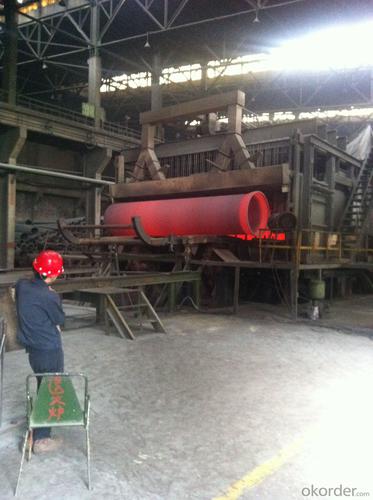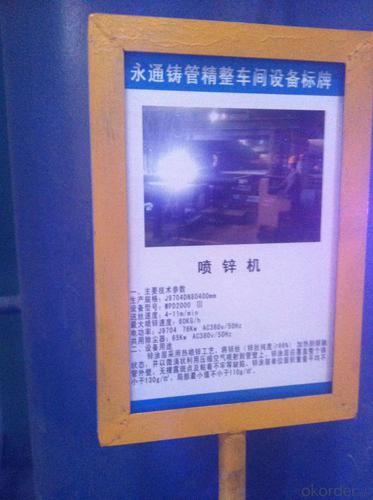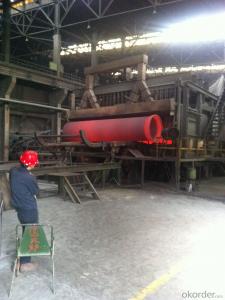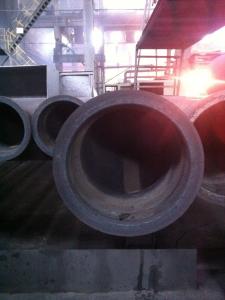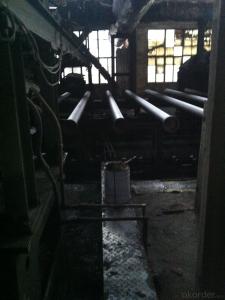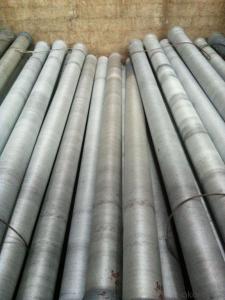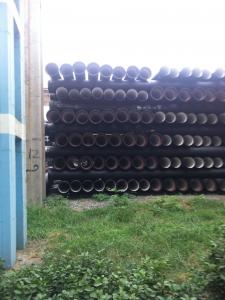DUCTILE IRON PIPES AND PIPE FITTINGS K9 CLASS DN600
- Loading Port:
- Tianjin
- Payment Terms:
- TT OR LC
- Min Order Qty:
- 22 pc
- Supply Capability:
- 3000 pc/month
OKorder Service Pledge
OKorder Financial Service
You Might Also Like
Material : Ductile Cast Iron
Size Range : DN 80mm to DN 2000mm
Unit Effective Length : 6m or 5.7m
Manufacture Standard: ISO 2531:1998/ EN 545:2006/EN 598:2007
Annual capacity : 200,000 tons
Coating Exterior: Zinc 130g/m2 according to ISO 8179-1 and bitumen coating 70 microns.
Cement Interior: Portland Cement/ High Alumina Cement/ Sulphate Resisting Cement Lining according to ISO 4179
Special requirements on external coating and internal lining can be applied
We also provide accessories such as SBR/EPDM rubber gaskets, lubricant paste, pipe caps, PE sleeves, etc.
Additional Parts:
Each pipe is strictly inspected according to related standard to ensure permanently high performance.
Easy Installation at site and service free for life
Long Service Lifespan
Quotation will arrive you within 24hours once we get your inquiry.
We guarantee offering you a competitive price.
A copy of original inspection reports of pipes will be offered after shipment.
Photos of loading process will be sent to the customer after shipment effect.
We will follow-up the delivery progress after shipment effect and update to the customer on weekly basis.
- Q: Is the cast iron pipe buried in need of antiseptic treatment? What kind of anticorrosive materials are used?
- Is to put the pipe surface rust corrosion, polished clean, brush again primer, and then wrapped a layer of glass cloth wrapped paint, two layers of glass cloth on the line, the thickness of not less than 6mm, painted with epoxy coal tar paint or asphalt paint
- Q: What is the expected noise reduction of ductile iron pipes?
- The expected noise reduction of ductile iron pipes can vary depending on several factors, including the specific characteristics of the pipe material and design, the installation method, and the surrounding environment. However, generally speaking, ductile iron pipes have been found to provide significant noise reduction compared to other pipe materials. Ductile iron pipes are known for their superior acoustic performance due to their dense and robust construction. The material's high density helps to absorb and dampen noise vibrations, reducing the transmission of sound waves through the pipe. Additionally, the smooth internal surface of ductile iron pipes minimizes turbulence and friction, further contributing to noise reduction. Various studies and field tests have shown that ductile iron pipes can achieve noise reductions ranging from 10 to 20 decibels (dB) or even higher, depending on specific conditions. These noise reductions can significantly improve the acoustic environment in areas where the pipes are used, such as residential areas, hospitals, or schools. It is important to note that while ductile iron pipes can provide substantial noise reduction, other factors such as pipe connections, fittings, and valves can affect the overall acoustic performance. Proper installation techniques, including the use of effective seals and dampers, can further enhance noise reduction. In conclusion, ductile iron pipes are expected to deliver notable noise reduction benefits due to their dense construction, smooth internal surface, and efficient installation methods. However, it is essential to consider the specific project requirements and consult with professionals to determine the expected noise reduction levels based on the particular circumstances.
- Q: Can ductile iron pipe be used for mining applications?
- Yes, ductile iron pipe can certainly be used for mining applications. Ductile iron is a type of cast iron that exhibits significant tensile strength, flexibility, and durability, making it suitable for demanding and rugged environments like mining. Its high strength-to-weight ratio allows for easy handling and installation, making it a cost-effective choice for mining operations. Ductile iron pipes are resistant to corrosion and have excellent mechanical properties, including high impact and fatigue resistance. These properties make them ideal for transporting various materials commonly found in mining, such as water, slurries, and abrasive ores. Additionally, ductile iron pipes have a long lifespan, ensuring reliable performance and minimal maintenance requirements in mining operations. Furthermore, ductile iron pipes can withstand high pressures and maintain their integrity under extreme conditions, making them suitable for underground mining applications. They can handle the demanding requirements of deep mining operations, including the transport of water for cooling or dust suppression, as well as the drainage of wastewater or mine dewatering. Overall, ductile iron pipes provide the necessary strength, resilience, and corrosion resistance required for mining applications. Their versatility, durability, and ease of installation make them a valuable choice for mining operations, ensuring efficient and reliable material transport while minimizing downtime and maintenance costs.
- Q: What are the disadvantages of using ductile iron pipes?
- There are several disadvantages associated with using ductile iron pipes in various applications. Firstly, ductile iron pipes tend to be more expensive compared to other types of pipes, such as PVC or HDPE. This can be a significant drawback for projects with budget constraints. Secondly, ductile iron pipes are relatively heavy, which makes transportation and installation more labor-intensive and time-consuming. This can increase the overall cost of the project, especially when considering the need for specialized equipment and a skilled workforce. Another disadvantage is that ductile iron pipes are susceptible to corrosion. Over time, exposure to various environmental factors, such as soil conditions and water chemistry, can lead to the formation of rust and scale on the inner and outer surfaces of the pipe. This can reduce the pipe's lifespan and potentially affect water quality. Furthermore, ductile iron pipes can be prone to cracking or breaking under certain conditions, especially if exposed to heavy loads or significant ground movement. This can result in costly repairs or replacements, leading to additional expenses and disruptions to the water supply. Lastly, ductile iron pipes have a relatively low resistance to impact and abrasion compared to some other materials. This means they may be more prone to damage from external forces, such as construction activities or accidental impacts, which can further increase maintenance and repair costs. Overall, while ductile iron pipes have their advantages, such as high tensile strength and durability, it is important to consider these disadvantages before deciding on their use in a particular project.
- Q: Are ductile iron pipes suitable for use in chemical processing plants?
- Ductile iron pipes can be used in chemical processing plants. This type of cast iron, known as ductile iron, has improved mechanical properties that make it resistant to corrosion and suitable for handling various chemicals in industrial settings. It is recognized for its durability, flexibility, and high tensile strength, allowing it to withstand the often present high-pressure and temperature conditions in chemical processing plants. Moreover, ductile iron pipes have a smooth internal surface, reducing friction and the possibility of flow blockages or contamination. In conclusion, ductile iron pipes are a dependable and cost-effective option for transporting chemicals in chemical processing plants.
- Q: Can ductile iron pipes be used for underground mining applications?
- Underground mining applications can indeed utilize ductile iron pipes. Ductile iron, renowned for its robustness, is capable of enduring the demanding conditions and weighty burdens that mining ventures entail. This material exhibits remarkable resistance to corrosion and possesses the capacity to withstand high-pressure and high-temperature settings. Furthermore, ductile iron pipes offer flexibility, facilitating effortless installation and maintenance, rendering them fitting for underground mining applications that prioritize mobility and adaptability. In summary, ductile iron pipes present a dependable and economical option for underground mining operations.
- Q: Can ductile iron pipes be used in oil or gas transmission pipelines?
- Ductile iron pipes are applicable for oil or gas transmission pipelines. They belong to the cast iron category and possess enhanced characteristics, including increased tensile strength and ductility. These properties make them suitable for various applications, including pipeline systems used in oil and gas transmission. The corrosion resistance of ductile iron pipes is exceptional, which is crucial for pipelines that transport oil or gas over long distances. This material exhibits a high resistance to external factors such as soil chemicals, moisture, and corrosive gases commonly found in the oil and gas industry. Moreover, ductile iron pipes can endure high pressures and temperatures, making them suitable for the demanding requirements of oil and gas transmission. Moreover, ductile iron pipes have excellent impact resistance, enabling them to absorb and withstand external forces such as ground movement or heavy loads. This durability ensures the integrity and longevity of the pipeline system, minimizing the risk of leaks or failures. In summary, ductile iron pipes provide a reliable and cost-effective solution for oil and gas transmission pipelines. Their robustness, corrosion resistance, and ability to withstand high pressures and temperatures make them a viable choice for this critical infrastructure.
- Q: What is a slide in type T flexible interface?
- As long as the socket is inserted into the slot, the installation is quick, labor-saving and airtight, and what is good is also good
- Q: Can ductile iron pipes be made of flexible waterproof sleeves?
- The casing can be divided into ordinary casing to be 2-4 cm thick than the pipe to be used and fixed to the wall or plate, and the pipe passes through it. Flexible bushing - between the casing and pipe, with flexible material to seal the sealing effect. Rigid casing - that is, between the casing and pipe with rigid material sealed to achieve sealing effect. Waterproof casing - is the use of the casing of the environment is to prevent liquid leakage or leakage into place (such as the pool, septic tanks, basement, etc.) is on the outer wall of the bushing is not less than 1 times increase waterproof wing, this wall is poured in the casing as a whole, not because of swelling shrinkage factor and crack and leakage.
- Q: Are ductile iron pipes resistant to UV radiation?
- No, ductile iron pipes are not resistant to UV radiation. UV radiation can cause degradation and weakening of the material over time. To protect ductile iron pipes from UV radiation, they should be coated or wrapped with a UV-resistant material or painted with a suitable protective coating. Additionally, proper maintenance and regular inspections should be carried out to detect and address any signs of UV damage.
Send your message to us
DUCTILE IRON PIPES AND PIPE FITTINGS K9 CLASS DN600
- Loading Port:
- Tianjin
- Payment Terms:
- TT OR LC
- Min Order Qty:
- 22 pc
- Supply Capability:
- 3000 pc/month
OKorder Service Pledge
OKorder Financial Service
Similar products
Hot products
Hot Searches
Related keywords
